人教版七年级英语下册各知识点归纳总结
人教版初中英语七年级下册知识点总结
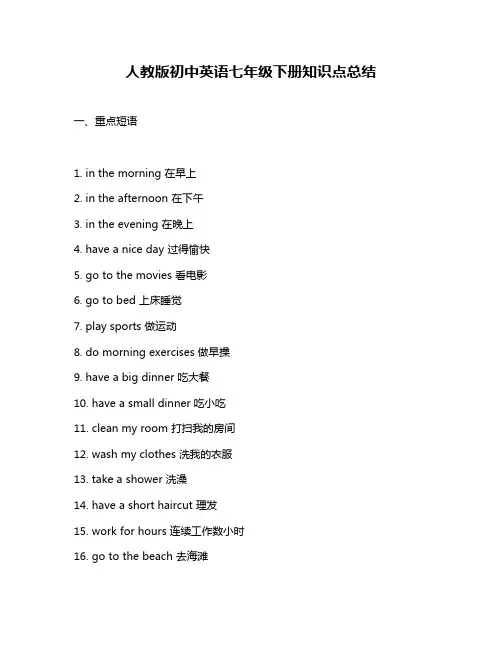
人教版初中英语七年级下册知识点总结一、重点短语1. in the morning 在早上2. in the afternoon 在下午3. in the evening 在晚上4. have a nice day 过得愉快5. go to the movies 看电影6. go to bed 上床睡觉7. play sports 做运动8. do morning exercises 做早操9. have a big dinner 吃大餐10. have a small dinner 吃小吃11. clean my room 打扫我的房间12. wash my clothes 洗我的衣服13. take a shower 洗澡14. have a short haircut 理发15. work for hours 连续工作数小时16. go to the beach 去海滩17. on the weekend 在周末18. listen to music 听音乐19. have a party 举办聚会20. watch TV 看电视21. play computer games 玩电脑游戏22. in the pool 在游泳池里23. go to the zoo 去动物园24. in the mountains 在山里25. have fun 玩得开心26. the great wall 长城27. many places of interest 名胜古迹28. be ready for 为……准备好29. stay healthy 保持健康30. how much 多少31. would you like 一些……吗?32. some noodles 一些面条33. order a pizza 定一个披萨饼34. make a phone order 电话订购35. would you like to do sth 你愿意做某事吗?36. want to do sth 想做某事37. would you like +名词你愿意要……吗?38. would you like +动词不定式你愿意……吗?39. choose some food 选择一些食物40. order the food 订购食物41. be careful 当心;小心42. not much 不多;少量的43. be ready to do sth 准备好做某事。
人教版七年级英语下册各知识点归纳总结
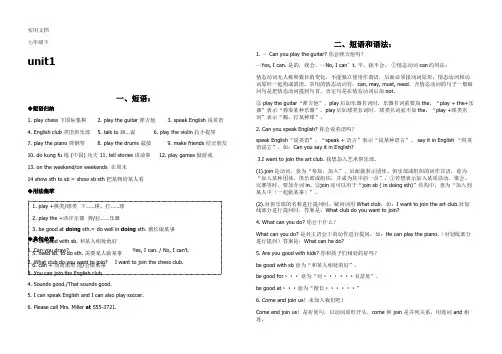
七年级下unit1一、短语:◆短语归纳1. play chess 下国际象棋2. play the guitar 弹吉他3. speak English 说英语4. English club 英语俱乐部5. talk to 跟…说6. play the violin 拉小提琴7. play the piano 弹钢琴8. play the drums 敲鼓9. make friends 结交朋友10. do kung fu 练 (中国) 功夫 11. tell stories 讲故事 12. play games 做游戏13. on the weekend/on weekends 在周末14 show sth to sb = show sb sth 把某物给某人看◆用法集萃◆典句必背1. Can you draw? Yes, I can. / No, I can’t.2. What club do you want to join? I want to join the chess club.3. You can join the English club.4. Sounds good./That sounds good.5. I can speak English and I can also play soccer.6. Please call Mrs. Miller at 555-3721.二、短语和语法:1. — Can you play the guitar? 你会弹吉他吗?—Yes, I can. 是的,我会。
—No, I can’t. 不,我不会。
①情态动词can的用法:情态动词无人称和数目的变化,不能独立使用作谓语,后面必须接动词原形,情态动词和动词原形一起构成谓语。
常用的情态动词有:can, may, must, need。
含情态动词的句子一般疑问句是把情态动词提到句首,否定句是在情态动词后加not。
人教版七年级下册英语语法知识点归纳总结
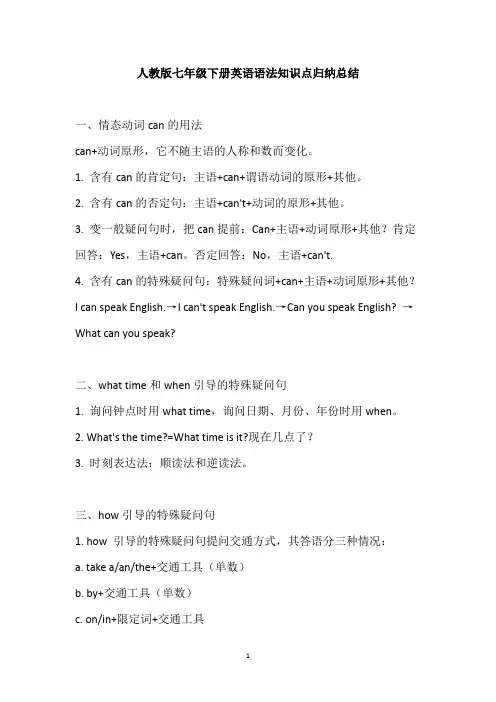
人教版七年级下册英语语法知识点归纳总结一、情态动词can的用法can+动词原形,它不随主语的人称和数而变化。
1. 含有can的肯定句:主语+can+谓语动词的原形+其他。
2. 含有can的否定句:主语+can't+动词的原形+其他。
3. 变一般疑问句时,把can提前:Can+主语+动词原形+其他?肯定回答:Yes,主语+can。
否定回答:No,主语+can't.4. 含有can的特殊疑问句:特殊疑问词+can+主语+动词原形+其他?I can speak English.→I can't speak English.→Can you speak English? →What can you speak?二、what time和when引导的特殊疑问句1. 询问钟点时用what time,询问日期、月份、年份时用when。
2. What's the time?=What time is it?现在几点了?3. 时刻表达法:顺读法和逆读法。
三、how引导的特殊疑问句1. how 引导的特殊疑问句提问交通方式,其答语分三种情况:a. take a/an/the+交通工具(单数)b. by+交通工具(单数)c. on/in+限定词+交通工具---How do you go to school every day?---I take a bus to go to school every day./I go to school by bus every day./I go to school on the bus every day.2. how far 用来提问距离,多远,其答语分为两种:(1)用长度单位表示:It is five kilometers.(2)用时间表示:It’s twenty minutes’walk.3. how long 用来提问时间,意为多久回答常用“for+段时”。
人教版七年级下册英语各单元知识点归纳
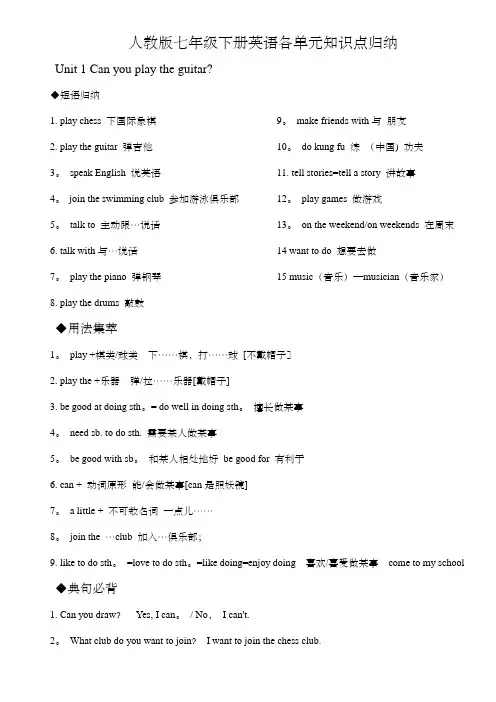
5。be good with sb。和某人相处地好be good for有利于
6. can +动词原形能/会做某事[can是照妖镜]
7。a little +不可数名词一点儿……
8。join the…club加入…俱乐部;
9. like to do sth。=love to do sth。=like doing=enjoy doing喜欢/喜爱做某事come to my school
6 No+doing或者No+名词,例如No swimming!No photos!
Unit 5 Why do you like pandas?
◆短语归纳
1. kind of = a little有几分,有点儿,修饰形容词,表示程度
14 want to do想要去做
15 music(音乐)—musician(音乐家)
◆用法集萃
1。play +棋类/球类下……棋,打……球[不戴帽子]
2. play the +乐器弹/拉……乐器[戴帽子]
3. be good at doing sth。= do well in doing sth。擅长做某事
6. It is + adj. + to do sth.做某事是….It是形式主语,不定式是真正的主语
7. Thanks for + n。/ doing感谢你(做)某事。He is like a father to me.【like】是介词,表示“像"8 What do you think of the movie?=How do you like the movie?你认为这部电影总么样?
人教版七年级英语下册总复习知识点考点总结归纳
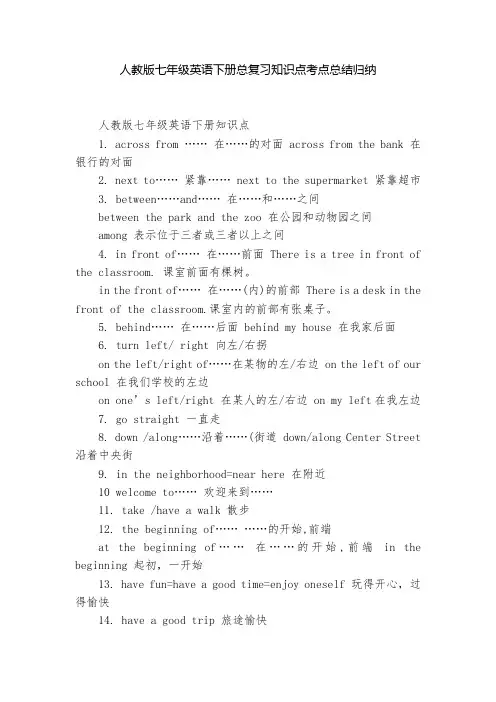
人教版七年级英语下册总复习知识点考点总结归纳人教版七年级英语下册知识点1. across from ……在……的对面 across from the bank 在银行的对面2. next to……紧靠…… next to the supermarket 紧靠超市3. between……and……在……和……之间between the park and the zoo 在公园和动物园之间among 表示位于三者或三者以上之间4. in front of……在……前面 There is a tree in front of the classroom. 课室前面有棵树。
in the front of……在……(内)的前部 There is a desk in the front of the classroom.课室内的前部有张桌子。
5. behind……在……后面 behind my house 在我家后面6. turn left/ right 向左/右拐on the left/right of……在某物的左/右边 on the left of our school 在我们学校的左边on one’s left/right 在某人的左/右边 on my left在我左边7. go straight 一直走8. down /along……沿着……(街道 down/along Center Street 沿着中央街9. in the neighborhood=near here 在附近10 welcome to……欢迎来到……11. take /have a walk 散步12. the beginning of…………的开始,前端at the beginning of……在……的开始,前端in the beginning 起初,一开始13. have fun=have a good time=enjoy oneself 玩得开心,过得愉快14. have a good trip 旅途愉快15. take a taxi 坐出租车16. 到达:get to +地方get here/ there/ home 到这/那/家 arrive in +大地方 I arrive in Beijing. arrive at +小地方I arrive at the bank. reach +地方17.go across 从物体表面横过 go across the street横过马路go through 从空间穿过 go through the forest穿过树林18.on + 街道的名称。
人教版七年级英语下册Unit1 - 知识点归纳
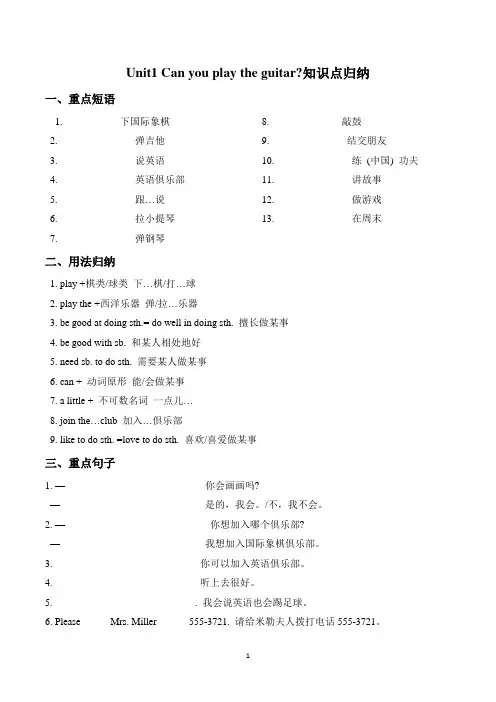
Unit1 Can you play the guitar?知识点归纳一、重点短语1. ___________下国际象棋2. ______________ 弹吉他3. ______________ 说英语4. ______________ 英语俱乐部5. ______________ 跟…说6. ______________ 拉小提琴7. ______________ 弹钢琴8. ______________敲鼓9. ______________ 结交朋友10. ______________ 练(中国) 功夫11. ______________ 讲故事12. ______________ 做游戏13. ______________ 在周末二、用法归纳1. play +棋类/球类下…棋/打…球2. play the +西洋乐器弹/拉…乐器3. be good at doing sth.= do well in doing sth. 擅长做某事4. be good with sb. 和某人相处地好5. need sb. to do sth. 需要某人做某事6. can + 动词原形能/会做某事7. a little + 不可数名词一点儿…8. join the…club 加入…俱乐部9. like to do sth. =love to do sth. 喜欢/喜爱做某事三、重点句子1. —____________________________你会画画吗?—____________________________ 是的,我会。
/不,我不会。
2. —____________________________ 你想加入哪个俱乐部?—____________________________ 我想加入国际象棋俱乐部。
3. ____________________________ 你可以加入英语俱乐部。
4. ____________________________ 听上去很好。
人教版七年级英语下册单元知识点总结(全册)
人教版七年级英语下册单元知识点总结(全册)Unit 1 Can you play the guitar?一短语归纳1.speak English/Chinese 说英语/汉语2. what club /sports什么俱乐部/运动3.play the guitar/ piano/drums/ violin 弹吉它/弹钢琴/敲鼓/拉小提琴4. play chess/ basketball/ volleyball/ soccer 下国际象棋/ 打篮球/排球/足球5.tell stories讲故6. the art/chess/swimming/sports/ story telling/English club艺术/国际象棋/游泳/体育/讲故事/英语俱乐部7.school show 学校演出8.sound good听起来不错9.teach music 教音乐10.do kung fu练(中国) 功夫11.make friends(with sb.)(结交朋友)12.on the weekend/on weekends在周末e and show us来给我们表演15.write stories写故事16.after school放学后17.English-speaking students说英语的学生18.play games 做游戏19.the Students’ Sports Center学生运动中心20.at the old people’s home在老人之家21.be in our school music festival 参加学校音乐节22.jion the music club加入音乐俱乐部二用法集萃1. play +棋类/球类下……棋,打……球2. play the +乐器弹/拉……乐器3. be good at doing sth.擅长做某事be good for.. 对… 有好处be good /kind to … 对… 友好4. be good with sb. 和某人相处地好; 善于应付(处理)…5. need(sb./sth.)to do… 需要(某人/某物)做….6. can + 动词原形能/会做某事7. a little + 不可数名词: 一点儿……9. like to do sth.或like doing sth. 喜欢做某事10.want to do…想做……11.What about…?…怎么样?(后面接Ving/代词/名词)12. talk用法: talk to/with sb. 跟某人说话talk about sth. 谈论某事tell 用法:tell sb sth. 告诉某人某事tell sb to do sth 告诉某人去做某事tell stories 讲故事say用法:say直接加说话的内容/itspeak用法:speak +语言13.help sb. with sth在某方面帮助某人= help sb.(to)do sth14.be free /busy有空/很忙15. call sb. at+号码拨打某人的……号码16. be in=join …成为…中的一员(P6)17.want …for the school show为学校表演招聘……三典句必背1. Can you draw? 你会画画吗?Yes, I can. / No, I can’t.是,我会。
人教版七年级下册英语各单元知识点总结
人教版七年级下册英语各单元知识点归纳如下:第一单元:1. 描述人的外貌特征的形容词:tall/short/tall and short/thin/fat/thin and fat/kind/nice/good-looking2. 询问别人名字的句型:What's your name?3. 介绍自己并问候的句型:Hello/Hi, my name is... Nice to meet you.第二单元:1. 询问别人年龄的句型:How old is...?2. 询问别人住在哪里的句型:Where do/does... live?3. 描述国家的形容词:China/England/America/Canada等第三单元:1. 表示频率的短语:never/always/usually/often/sometimes2. 表示喜欢不喜欢的一般疑问句:Do you like...? Yes, I do. /No, I don't.3. 描述食品和饮料的单词:fruit/cake/hamburger/bread/noodles等第四单元:1. 表示身体部位的单词:head/face/nose/mouth/eye/ear2. 表示颜色的单词:red/green/blue/yellow等3. 表示服装的单词:shirt/coat/pants/skirt/jeans等第五单元:1. 询问别人是否做某事的句型:Do you play...? Yes, I do. /No, I don't.2. 表示运动的单词:basketball/volleyball/ping-pong/swimming等第六单元:1. 表示位置关系的短语:next to/behind/in front of/in the corner等2. 表示动作方向的短语:come in/go out/turn left/turn right等3. 表示顺序的短语:st等第七单元:1. 询问别人是否同意自己观点的句型:Do you agree with me? Yes, I do. /No, I don't quite.2. 表示同意或不同意的短语:agree with sb./agree to sth./agree to do sth./agree to disagree on sth.等。
人教版七年级下册英语知识点复习(完整版)
人教版七年级下册英语知识点复习(完整版) Unit 1 Can you play the guitar?1,情态动词+V原can do= be able to do2,Play+ the+ 乐器+球类,棋类3,join 参加社团、组织、团体4,4个说的区别:say+内容Speak+语言Talk 谈论talk about sth talk with sb talk to sbTell 告诉,讲述tell sb (not)to do sthTell stories/ jokes5,want= would like +(sb)to do sth6,4个也的区别:too 肯定句末(前面加逗号)Either否定句末(前面加逗号)Also 行前be 后As well 口语中(前面不加逗号)7,be good at+ V-ing=do well in 擅长于be good for 对…有益(be bad for对…有害)be good to 对…友好(good 可用friendly,nice,kind替换)be good with和…相处好=get on/ along well with8,特殊疑问句的构成:疑问词+一般疑问句9,How/ what about+V-ing …怎么样?(表建议)10,感官动词(look, sound, taste, smell, feel)+adj/ like11,选择疑问句:回答不能直接用Yes或者No,要从中选择一个回答12,students wanted for school show(wanted表示招募,含有被动意义)13,show sth to sb=show sb sth give sth to sb=give sb sth14,help sb (to)do sthHelp sb with sthWith sb’s help= with the help of sbHelp oneself to 随便享用15,be busy doing sth/ be busy with sth16,need to do sth17,be free= have time18,have friends= make friends19,call sb at +电话号码20,on the weekend= on weekends21,English-speaking students 说英语的学生(带有连词符,有形容词性质)22,do kung fu表演功夫Unit 2 What time do you go to school?1,问时间用what time或者whenAt+钟点at 7 o’clock at noon/ at night(during/ in the day)On+ 具体某天、星期、特指的一天on April 1st on Sunday on a cold winter morningIn +年、月、上午、下午、晚上2,时间读法:顺读法逆读法:分钟≤30用past five past eight(8:05)half past eight(8:30)分钟>30用to a quarter to ten(9:45)整点用…o’clock 7 o’clock(7:00)3,3个穿的区别:wear 表状态,接服装、手套、眼镜、香水等Put on 表动作,接服装Dress 表动作,接sb/ oneself get dressed穿衣3,感叹句:How+adj+主谓!How+adj+a/an +n单+主谓!What+ a/an +adj+ n单+主谓!What+ adj+ n复/ 不可数+主谓!4,from…to…5,be/ arrive late for6,频度副词(行前be 后)Always usually often sometimes seldom hardly never7,一段时间前面要用介词for for half an hour for five minutes8,eat/ have…for breakfast/ lunch/ dinner/ supper9,either…or10,a lot of=lots of11,it is +adj+for sb +to do sth (adj修饰to do sth)It is important for me to learn English.it is +adj+of sb +to do sth (adj修饰sb)It is kind/ friendly/ nice of you to help me.Unit 3 How do you get to school?1,疑问词How 如何(方式)how long 多长(时间)答语常用“(For/ about +)时间段”how far多远(距离)答语常用“(It’s +)数词 +miles/ meters/ kilometers”how often多久一次(频率)答语常用“Always/ often/ every day/…”或“次数+时间”等表频率的状语How soon多快,多久以后,常用在将来时中。
人教版英语七年级下册Units1-4知识点总结
人教版英语七年级下册Units1-4单元知识点归纳总结Unit1Can you play the guitar?一、重点短语1.at the old people's home在敬老院2.be good at singing善于唱歌3.be good at swimming善于游泳4.be good at dancing跳舞5.be good with old people与老人相处得好6.be in our school music festival参加我们学校的音乐节e and show us来给我们展示一下e to the Students'Sports Center来学生运动中心9.do Chinese kung fu表演中国功夫10.English-speaking students说英语的学生11.help with sports在运动方面提供帮助12.in the music room在音乐室13.in the school music club在学校音乐俱乐部14.in the school show在学校汇演中15.join the swimming club加入游泳俱乐部16.like drawing/like to draw喜欢画画17.make friends with sb.和某人交朋友18.musicians wanted招聘音乐家19.need help to teach music需要帮助去教音乐20.on the weekend/on weekends(在)周末21.play chess下国际象棋22.play games with people与人玩游戏23.play the drums打鼓24.play the guitar弹吉他25.play the piano弹钢琴26.play the violin拉小提琴27.students wanted for the school show为学校演出招募学生28.tell stories讲故事29.the story telling club讲故事俱乐部30.talk to/with和某人谈话31.talk with sb.about sth.和某人谈论某事二、重点句型1.—Can you play the guitar or the violin?你会弹吉他还是拉小提琴?—I can play the guitar.我会弹吉他。
- 1、下载文档前请自行甄别文档内容的完整性,平台不提供额外的编辑、内容补充、找答案等附加服务。
- 2、"仅部分预览"的文档,不可在线预览部分如存在完整性等问题,可反馈申请退款(可完整预览的文档不适用该条件!)。
- 3、如文档侵犯您的权益,请联系客服反馈,我们会尽快为您处理(人工客服工作时间:9:00-18:30)。
七年级下unit1一、短语:◆短语归纳1. play chess 下国际象棋2. play the guitar 弹吉他3. speak English 说英语4. English club 英语俱乐部5. talk to 跟…说6. play the violin 拉小提琴7. play the piano 弹钢琴8. play the drums 敲鼓9. make friends 结交朋友10. do kung fu 练 (中国) 功夫 11. tell stories 讲故事 12. play games 做游戏13. on the weekend/on weekends 在周末14 show sth to sb = show sb sth 把某物给某人看◆用法集萃◆典句必背1. Can you draw? Yes, I can. / No, I can’t.2. What club do you want to join? I want to join the chess club.3. You can join the English club.4. Sounds good./That sounds good.5. I can speak English and I can also play soccer.6. Please call Mrs. Miller at 555-3721.二、短语和语法:1. — Can you play the guitar? 你会弹吉他吗?—Yes, I can. 是的,我会。
—No, I can’t. 不,我不会。
①情态动词can的用法:情态动词无人称和数目的变化,不能独立使用作谓语,后面必须接动词原形,情态动词和动词原形一起构成谓语。
常用的情态动词有:can, may, must, need。
含情态动词的句子一般疑问句是把情态动词提到句首,否定句是在情态动词后加not。
② play the guitar“弹吉他”,play后加乐器名词时,乐器名词前要加the,“play + the+乐器”表示“弹奏某种乐器”。
play后加球类名词时,球类名词前不加the,“play +球类名词”表示“踢、打某种球”。
2. Can you speak English? 你会说英语吗?speak English“说英语”,“speak + 语言”表示“说某种语言”。
say it in English “用英语说它”,如:Can you say it in English?3.I want to join the art club. 我想加入艺术俱乐部。
(1).join是动词,意为“参加,加入”,后面接表示团体、俱乐部或组织的词作宾语,意为“加入某种团体、俱乐部或组织,并成为其中的一员”。
①若想表示加入某项活动、聚会、比赛等时,要加介词in。
②join还可以用于“join sb ( in doing sth)”结构中,意为“加入到某人中(一起做某事)”。
(2).对俱乐部的名称进行提问时,疑问词用What club,如:I want to join the art club.对划线部分进行提问时,答案是:What club do you want to join?4. What can you do? 你会干什么?What can you do? 是对主语会干的动作进行提问。
如:He can play the piano.(对划线部分进行提问)答案是:What can he do?5. Are you good with kids? 你和孩子们相处的好吗?be good with sb 意为“和某人相处的好”,be good for···意为“对······有益处”,be good at···意为“擅长······”1. play +棋类/球类下……棋,打……球2. play the +西洋乐器弹/拉……乐器3. be good at doing sth.= do well in doing sth. 擅长做某事4. be good with sb. 和某人相处地好5. need sb. to do sth. 需要某人做某事6. can + 动词原形能/会做某事6. Come and join us!来加入我们吧!Come and join us!是祈使句,以动词原形开头。
come 和 join 是并列关系,用连词 and 相连。
7. Can you help kids with swimming? 你能帮助孩子们游泳吗? help sb with sth / doing sth 意为“帮助某人干某事”8. Musicians Wanted for School Music Festival为学校的音乐节招聘音乐家职业名词 + wanted表示“招聘···”9. Can you play the piano, the trumpet, the drums or the guitar? 你会弹钢琴、吹喇叭、敲鼓还是会弹吉他?这是一个选择疑问句,并列的选项用or连起来,选择疑问句不能用Yes或No回答,只能答其中的一个选项。
如:—Are you in Class 1 or Class 2? —I’m in Class 1. / I’m in Class 2.10.We want two good musicians for our rock band. 我们想为我们的摇滚乐队招聘两个音乐家。
for our rock band意为“为我们的摇滚乐队“ 11.I can do Chinese kung fu. 我会表演中国功夫。
do Chinese kung fu意为“表演中国功夫”,其中的do是实意动词。
12.You can be in our school music festival. 你可以参加我们学校的音乐节。
be in意为“参加,加入”13.Please call Zhang Heng at 622-6033. 请给张恒打电话拨打622-6033。
call sb at + 电话号码意为“给某人打电话拨打···号 14. What’s your address? 你的地址在哪里?问“你的地址在哪里?”疑问词是what而不是where. 如:What’s your e-mail address? 15.Can you play the guitar well? 你弹吉他会弹得很好吗?play the guitar well “弹吉他弹得好”,well是good 的副词,用来修饰实义动词play,修饰实义动词要用副词。
e and show us. 来出示给我们看。
show sth to sb = show sb sth “把某物给某人看”如:Show your photo to me.= Show me your photo.情态动词的用法(1)Can情态动词can有一定的词义,但不能独立存在,它必须与动词原形一起构成谓语。
情态动词can 没有人称和数的变化。
其具体用法如下: 1.表示"能、会",指脑力或体力方面的"能力"。
例如: I can speak English.我会讲英语。
Jim can swim but I can't.吉姆会游泳,但我不会。
2.表示"可能",常用于否定句或疑问句中,指某种可能性。
例如: Han Mei can't be in the classroom.韩梅不可能在教室里。
Can he come here today, please?请问他今天能到这里来吗?3.表示"可以",常用于口语中,指许可或请求做某事。
例如: Can I have a cup of tea, please?请问我可以喝一杯茶吗? You can go out.你可以出去了?补充:①can在口语中可以代替may,表示许可或可以。
②can't在口语中代替mustn't时,表示禁止或不准。
例如:You can't play football in the street.不准在马路上踢足球。
③情态动词can的过去式could,用于现在时,可使语气更委婉、更客气。
例如: Could you help me with my English?你能帮助我学习英语吗?情态动词can的基本句型1.肯定句型为:主语+can+动词原形+其它。
例如: They can play basketball.他们能打篮球。
She can dance.她会跳舞。
You can go to watch TV.你可以去看电视了。
2.否定句型为:主语+can not(can't/cannot)+动词原形+其它。
表示"某人不能(不会。
不可能)做……"。
其中can't是can not的缩略式,英国多写成cannot。
例如: You cannot pass the ball like this.你不能像这样传球。
I can't ride a motorbike.我不会骑摩托车。
3.疑问句句型分为:一般疑问句句型和特殊疑问句句型两种类型。
⑴一般疑问句句型为:Can+主语+动词原形+其它。
表示"某人会(能。
可以)做……吗?",用于口语时,常表示请求或许可。
其肯定答语用""Yes,主语+can."作答;否定答语用"No,主语+can't."作答。
注意答语中作主语的人称代词,应根据问句中的主语作相应的变化。
其变化规则为:第一人称问,则第二人称答;第二人称问,则第一人称答;第三人称问,第三人称答。
例如:①-Can you sing an English song for us?你可以为我们大家唱一首英语歌吗? -Yes.行。
(注意在Yes后面常省略I can) ②-Can I skate?我可以滑冰吗? -Yes, you can.可以。
③-Can she climb hills?她能爬山吗? -No, she can't.不,她不能。
⑵特殊疑问句句型为:a. Who+can+动词原形+其它。
